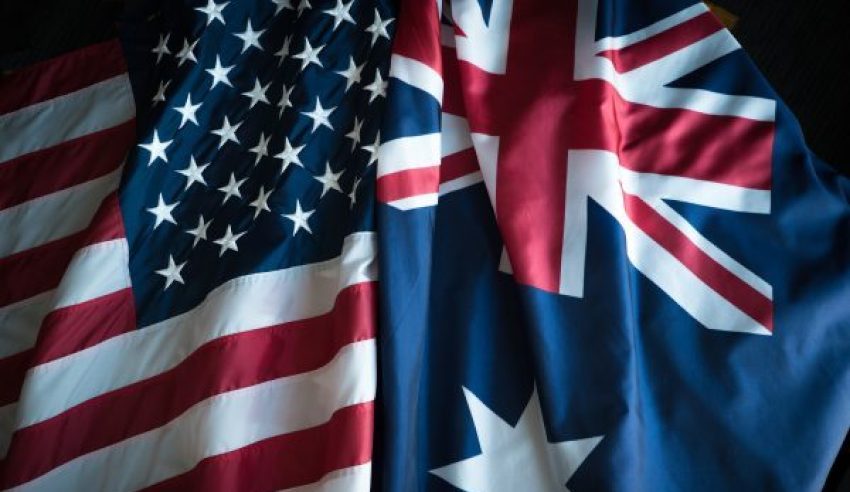Two key policy leaders with the Australian Strategic Policy Institute (ASPI) have identified the growing need for Australian defence policy planners and the supporting industry to embrace a strategic Plan B in the face of continuing US uncertainty towards the alliance and global rules-based order.
To continue reading the rest of this article, please log in.
Create free account to get unlimited news articles and more!
Both Peter Jennings and Paul Dibb are quick to highlight the growing uncertainty stemming from the increasingly erratic nature of the US President Donald Trump.
The bizzare Twitter wars, increasing trade disputes with China and the European Union, growing fondness of Russian strongman Vladimir Putin and North Korean leader Kim Jong-un, combined with Trump's chastising of NATO allies for not pulling their financial and strategic weight in the face of increasing Russian aggression and mounting assertiveness by China in south-east Asia are all serving to unnerve Australian strategic thinkers who have, for the better part of half a century, encouraged dependence on the US and its capability to 'reach out and touch' potential threats to Australia's interests
For Jennings, this developing situation raises a particularly important question: "What's the plan for Australia's defence, if it turns out that Trump's America First approach is here to stay and alliances fall into mistrustful neglect?"
This is particularly important for key US personnel rotations through the region, including the Marine Rotational Force – Darwin, which Jennings says could result in "Trump [asking] why US Marines are working out of Darwin, seeing the bill, but not the benefit of a military presence reassuring south-east Asia".
Dibb paints the situation in a darker light, saying, "Australia's international security outlook is starting to look very threatening. The White House is undermining the international order, has started a trade war with China and the EU, and is threatening the unity of NATO. At the same time, China and Russia are becoming increasingly assertive."
In response, both policymakers suggest that it is time for a 'Plan B', as Jennings describes it, while Dibb identifies the need for a new defence policy in light of "America's belief in the system and willingness to invest in it with an effective network of alliances are now in doubt".
First and foremost, both men identify the need for any new Australian policy to focus on our region of primary strategic concern, which includes south-east Asia and the South China Sea, the eastern Indian Ocean and south Pacific, combined with increasing our role and position as a regional security leader in partnership with other regional democracies, particularly Japan and India.
Supporting this, there is a growing need for Australia to leverage and strengthen relationships with other regional powers, namely Indonesia, Vietnam and South Korea, and further abroad with key NATO allies the UK and France.
Most of these nations support robust defence industrial bases of their own, presenting avenues for improved research and development, knowledge transfer, industrial collaboration and trade for Australia's burgeoning defence industry. This possibility serves to diversify the national economy away from over dependence on China, which Dibb defines as "far too dependent for our economic wellbeing".
Furthermore, both Jennings and Dibb identify the need to increase the nation's defence expenditure from the current planned 2 per cent of GDP to approximately 2.5-3 per cent of GDP to increase procurement quantities and improve access to key American-made defence equipment to beef up the striking capability of the ADF through the introduction of long-range strike weaponry, including land-attack cruise missiles and a thinly veiled attempt to replace the F-111 with a more potent, jointly-developed long-range aerial strike platform, i.e. potentially a modified, Australian variant of the in-development B-21 Raider.
For the domestic industrial base, Jennings in particular advocates the development of an Australian version of the US Defence Advanced Research Projects Agency (DARPA) as a means of investing and further developing the nation's capacity to meet its own defence material requirements and develop cutting-edge technologies, working separately to the Defence bureaucracy to promote innovation and commercialisation avenues.
Recognising the changing nature of contemporary deterrence theory and modern warfare, this innovation approach should extend to expanding the nation's cyber capabilities beyond the defensive posture they currently possess, to focus on a credible, offensive, deterrent-focused cyber capability.
Finally, Jennings clearly articulates the need to expand the existing ADF beyond the 58,000 regulars currently serving to approximately 90,000 across the three branches, which he credits as "still tiny by regional standards, but would vastly strengthen our ability to operate the high-technology equipment that is central to a strong deterrent posture".
It is critical that Australia continue to support the robust alliance and relationship between the two nations, and each of the solutions identified by both Jennings and Dibb aim to prove to the US President that Australia remains an ally that pulls it's own weight, financially and strategically, in an effort to court continued US presence and commitment to broader regional alliances in light of continuing instability.
However, the question needs to be asked, with so many potential economic and industrial benefits for Australian business, should we be implementing some of the major recommendations identified and indeed others for our own piece of mind and benefit, regardless of America's continuing role and presence in the region?
Let us know your thoughts and suggestions in the comment section below.
Stephen Kuper
Steve has an extensive career across government, defence industry and advocacy, having previously worked for cabinet ministers at both Federal and State levels.

 Login
Login








